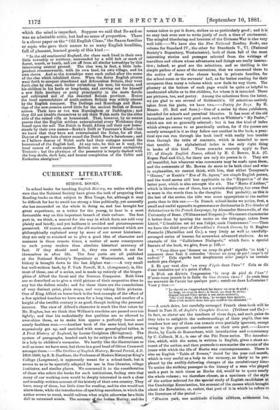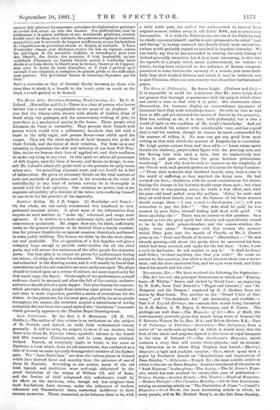CURRENT LITERATURE.
SCHOOL BOOKS.
In school books for teaching English History, we notice with plea- sure that the National Society have given the task of preparing their Reading-books on that subject to Miss Yonge, for, although it may be difficult for her to avoid too strong a bias politically, yet assuredly she has succeeded on the whole in doing so, and has brought her great experience, as a writer for the young, to bear in a most favourable way on this important branch of their culture. The first part is, we think, a marvel for the way in which facts are told very plainly and briefly, and yet baldness is avoided and picturesqueness preserved. Of course, some of the old stories are retained which are philosophically explained away by some of our newer historians ; they are only so retained as to give a good idea of character and manners in these remote times, a matter of more consequence to such young readers than absolute historical accuracy of fact. If they should need it, they can search it out for themselves in after life. The four parts are all published at the National Society's Depository at Westminster, and the history is brought down to the last Afghan war.—A very small but well-written book, by F. York Powell, M.A. (Longmans), is, like most of these, one of a series, and is made up entirely of the biogra- phies of Alfred the Great and the Norman Conqueror. Both lives are so described as to give a vivid picture of their respective time to any but the dullest minds ; and for these there are the consolations of very distinct print, plain maps, and very taking little pictures. One of King Alfred on horse-back is the best example of the effect of a few spirited touches we have seen for a long time, and another of a knight of the twelfth century is as good, though lacking the personal interest. The view of Alfred's character is much like that taken by Mr. Hughes, but we think that William's cruelties are passed over too lightly, and that his undoubtedly fine qualities are so allowed to over-shine them, as to make him appear a perfectly heroic and nearly faultless man.—Another book of the same kind, but more expensively got up, and enriched with some genealogical tables, is A First History of England, by Louise Creighton (Rivingtons). The system of paragraphs, headed each by its subject in different print, is a help to children's memories. We hardly like the illustrations so well as some we have seen, but there is a good head of Oliver Cromwell amongst them.—The Outline of English History, Second Period, A.D. 1603-1880, by S. R. Gardiner, the Professor of Modern History at King's College (Longmans), is apparently meant for a school-book, but it seems to us to be specially adapted for use in free libraries, village institutes, and similar places. We commend it to the consideration of those who select the books for such institutions, feeling sure that many of our working-men would be deeply interested in such a clear and sensibly-written account of the history of their own country. They have, many of them, but little time for reading, and its size would not alarm them, while the introduction of sparkling anecdotes, in which the author seems to excel, would enliven what might otherwise be a little dull to untrained minds. The account Age Indian Mutiny, and the means taken to put it down, strikes us as particularly good ; and it is no easy task even now to write justly of such a time of excitement. The mingled blundering and heroism of the Crimean War is also very well told.—We have also the New National Reading Books, one volume for Standard IV., the other for Standards V., VI. (National Society's Depository, Westminster), both of them fall of the most interesting stories and passages selected from the writings of travellers and others whose adventures and doings are really instruc- tive ; indeed, so good are the selections, and so thrilling is the simple pathos of some of the narrations, that we commend them to. the notice of those who choose books in private families, for the school-room or the servants' hall, as far better reading for their occupants than many a volume which now finds its way there. The glossary at the bottom of each page would be quite as helpful to. uneducated adults as to the children, for whom it is intended. There are pictures, too, and poetry. Among the selections from the latter, we are glad to see several of Goldsmith's. Of selections entirely taken from the poets, we have two.—Poetry for Boys. By D. Munro. (G. Bell and Sons.)—One of a series by these publishers,. intended for schools and parochial libraries. It has most of the old favourites and some very good ones, such as Whittier's " My Psalm," which are not so generally selected ; but it has the kind of index which always seems to us practically useless, for if the poems are merely arranged in it as they follow one another in the book, a prac- tical eye can run through the book itself with really less trouble than through the table of contents, which is intended to save that trouble. An alphabetical index is the only right thing- in books of this kind. These remarks scarcely apply to Part IV. of Simple English Poems, edited by H. C. Bowen, M.A. (C. Kegan Paul and Co.), for there are only six poems in it. They are all beautiful, but whatever wise comments may be made upon them, and the comments of Mr. Bowen do seem to be both clear and wise in explanation, we cannot think, with him, that either Tennyson's " CEnone," or Keats's " Eve of St. Agnes," are simple English poems, and the word seems still less applicable to the " Hyperion " of the latter poet, which is also amongst the six. The " Morte d'Arthur," which is likewise one of them, has a certain simplicity, but even that is more in the words than in the thoughts. But probably, as this is the last of the series, the title was more appropriate to the earlier parts than to this one.--In French school-books we notice, first, a small and useful appendix to grammars or dictionaries in The Gender of Substantives in the French Language, by Alexander Strouwelle, of the University of Bonn. (Williams and Norgate.)—We cannot characterise it better than by quoting the motto on the title-page, taken from Littre, " L'erudition eat ici non l'objet, mais l'instrument."—Then we have the third year of Macmillan's French Course, by G. Eugene Fasnacht (Macmillan and Co.), a very lively as well as carefully- arranged series of lessons for somewhat advanced students. As an example of the " Gallicismes Dialogues," which form a special feature of the book, we give, from p. 149,- 1. " Vous dites quo 'donner an coup de pied' signifie to kick' ; comment done font it entendre donner sin coup de pied fusgu'd tel endroit' ? Cela signifie tout simplement alter jusqu'a an certain endroit pen eloigne.
2. Et que vent .dire 'on coup d'epee dans l' eau' ? Cela se dit d'une tentative qui n'a point d'effet.
3. D'oh est derivee l'expression le coup de piel de l'ane' N'avez-vons jamais In la fable da lion devenu vieux ? Je crois bien me souvenir de l'avoir lue quelque part ; serait-ce dans Lafontaine l Vous y etes :- " Le checal en s'approchant lui donne un coup de pied ; Le loop, un coup de dent; le boat, un coup de carne; Qnand voyant rine meme a son antre acconrir, ' Oh! cent trop, dit le lion, 'je vodkas Men moarir, /dais c'est mourir deux fois clue souffrir tea atteintes.' " —A much drier, but carefully-arranged French class-book will be found in Part II. of Asplet's Complete Course. (Triibner and Co.)— In fact, so clever are the teachers of these days, and such pains do they take to enlighten the understandings of their pupils, that one wonders how any of them can remain even partially ignorant, except owing to the grossest carelessness on their own part.—Lazare Roche, by Emile de Bonnechose, with introduction and commentary by C. Colbeck, M.A., is one of the Pitt Press series. The introduc- tion, which, with the notes, is written in English, gives a short ac- count of the author, and then proceeds to summarise the events of the years with which the life of Roche was contemporaneous. There is also an English "Table of Events," dated for the year and month, which is very useful as a help to the memory, so likely to be per- plexed by the swiftly-following changes of the revolutionary time• To notice the striking passages in the history of a man who played such a part in such times as Roche did, would be to quote nearly the whole volume ; we therefore choose, as a specimen of the style of the author selected for the special study of English candidates at the Cambridge Examination, his account of the causes which brought about the Revolution, or, rather, that part of it in which he refers to the literature of the period :—
"D'autre part, une multitude d'ecrits celebres, avidement Ina,
avaient fait penetrer les nouveaux principes de regeneration politique at sociale fort avant an sein des masses. Ces publications, tout en s'adreesant a, la raison publique et aux sentiments genereux, avaient 45veille aussi de dangerenx instincts, des passions avengles et violentes, surexcitees par le souvenir de longues souffrances, et one lea lamiares de l'experience ne pouvaient encore ni diriger, ni contenir. A force d'entendre cheque jour declamer contre les lois en viguenr, centre lee privileges et les autorites etablies, et revendiquer pour tous des libertes, des droits, des ponvoirs, it Oak impossible triune multitude d'hommes ne fussent bientot portes h confondre leers droits avec lams desire, la liberte even la licence, l'horreur de roppres- sion avec la haine de toots discipline. et it etait h prevoir qa'il naltrait d'une situation si complexe de grands perils et des difficultes sans nombre. Ces previsions furent de beaucoup depassees par lee faits."
Such a character as that of General Roche becomes, to those who -have thus to study it, a benefit to the heart, quite as much as the head, a result greatly to be desired.































 Previous page
Previous page